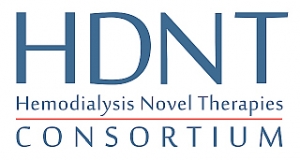[HDNT] Hemodialysis Novel Therapies Consortium

Funding: NIDDK
Investigators: Dember, LM; Landis, JR
The CRCU serves as the Data Coordinating Center for the Hemodialysis Novel Therapies Consortium (HDNT) - a partnership between four highly-regarded clinical centers, the University of Pennsylvania, and the National Institutes of Diabetes, Digestive, and Kidney Diseases (NIDDK). The HDNT Consortium was established by the (NIDDK) to design and conduct pilot and feasibility studies of novel therapies to reduce morbidity and mortality for patients treated with maintenance hemodialysis. The CRCU is responsible for designing, implementing, and overseeing execution of various components of these pilot studies, including protocol development, database development and management, research technology development, and oversight of day-to-day activities. The CRCU and HDNT Consortium have successfully implemented and completed two studies, and are in the process of launching two additional studies. The treatments being evaluated by the HDNT Consortium include drugs that have been in use for many years, dietary supplements, and new biologic agents that target specific inflammatory mediators. The goal of this collaborative group is conduct studies that will provide the necessary information to move the evaluation of promising interventions from early phase studies to large-scale clinical trials that will ultimately improve outcomes for patients treated with maintenance hemodialysis.
Safety and Cardiovascular Efficacy of Spironolactone in Dialysis-Dependent ESRD (SPin-D) Trial (Launched Spring 2015)
The SPin-D Trial was designed to assess the safety and tolerability of multiple doses of chronic Spironolactone therapy compared with placebo in maintenance hemodialysis patients, and to generate pilot estimates of the effect of spironolactone compared with placebo on cardiovascular efficacy parameters in maintenance hemodialysis.
Gut Microbiome and p-Inulin in Hemodialysis (Launched Fall 2015)
Alterations in the intestinal microbiome (dysbiosis) are increasingly recognized as potential causes of inflammation and cardiovascular disease in patients with end-stage renal disease (ESRD). There are important potential benefits of intervening to restore symbiosis to the gut microbiota in these patients. The purpose of this study was to fill some of these gaps in anticipation of ultimately investigating the therapeutic potential of altering the composition and/or function of the gut microbiome in this patient population. The study also aimed to provide information about the tolerability and safety of p-inulin and the feasibility of biosample collection to inform the design of future studies with this agent.
Anti-Cytokine Therapy for Hemodialysis Inflammation (ACTION) (Anticipated Launch – Spring 2017)
The ACTION Trial was designed to assess the safety and tolerability of anakinra compared with placebo in maintenance hemodialysis patients, to assess the efficacy of anakinra for reducing CRP (C-reactive protein) in maintenance hemodialysis patients, and to generate pilot estimates of the effect of anakinra compared with placebo on markers of inflammation, cardiovascular risk, nutrition and metabolism, and patient reported outcomes for patients receiving maintenance hemodialysis.
Safety and Cardiovascular Efficacy of Hydralazine and Isosorbide Dinitrate in Dialysis-Dependent ESRD (HIDE) (Anticipated Launch – Spring 2017)
The HIDE Trial aims to characterize the safety, tolerability, and cardiovascular impact of combination ISD/HY therapy compared with placebo in maintenance hemodialysis patients, and to assess the feasibility of larger trials. The study is designed to broaden insight into the potential effects of therapy on cardiac structure and function in individuals with dialysis dependent ESRD by focusing on diastolic function, myocardial fibrosis, and microvascular supply and function.